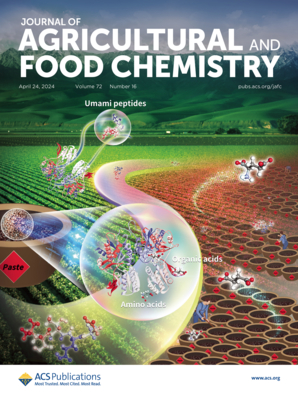Synbiotic Combination of Lactiplantibacillus plantarum and Fructo-Oligosaccharide Alleviates Soy Protein-Induced Food Allergies in Mice by Modulating the Gut Microbiota and Its Metabolisms
IF 5.7
1区 农林科学
Q1 AGRICULTURE, MULTIDISCIPLINARY
引用次数: 0
Abstract
Oral administration of synbiotics is a highly effective approach to improve food allergies through the modulation of gut microbiota. Therefore, the effects of synbiotics composed of Lactiplantibacillus plantarum (Lp) and fructo-oligosaccharide (FOS) on soybean-sensitized mice were explored in this study focusing on the gut microbiota and metabolisms. The results indicated that Lp-FOS intervention significantly alleviated allergic symptoms, reduced the IgE, IgG1, and mMCP-1 levels, restored the balance of Th1/Th2 and Tregs/Th17, and enhanced intestinal barrier integrity. 16S rDNA microbiome sequencing revealed that Lp-FOS increased the Lachnospiraceae and Lactobacillus proportions and reduced the Desulfovibrionaceae and Muribaculaceae proportions. Nontargeted metabolomics further demonstrated that Lp-FOS improved gut metabolic disorders by modulating key pathways involved in amino acid metabolism, cofactor and vitamin metabolism, and lipid metabolism, with a notable enhancement in tryptophan metabolism. Collectively, this study confirmed that Lp-FOS could mitigate soybean allergy by regulating the immune system, gut microbiota, and metabolic pathway. This study will offer novel insights into developing synbiotic-based interventions against food allergies.

植物乳杆菌和低聚果糖通过调节肠道菌群及其代谢减轻大豆蛋白诱导的小鼠食物过敏
口服合成抗生素是通过调节肠道菌群来改善食物过敏的一种非常有效的方法。因此,本研究以植物乳杆菌(Lp)和低聚果糖(FOS)组成的合生剂对大豆致敏小鼠肠道菌群和代谢的影响为重点,探讨其对大豆致敏小鼠的影响。结果表明,Lp-FOS干预可显著缓解过敏症状,降低IgE、IgG1和mMCP-1水平,恢复Th1/Th2和Tregs/Th17平衡,增强肠屏障完整性。16S rDNA微生物组测序结果显示,Lp-FOS增加了Lachnospiraceae和Lactobacillus的比例,降低了Desulfovibrionaceae和Muribaculaceae的比例。非靶向代谢组学进一步证明,Lp-FOS通过调节氨基酸代谢、辅助因子和维生素代谢以及脂质代谢等关键途径改善肠道代谢紊乱,其中色氨酸代谢显著增强。综上所述,本研究证实Lp-FOS可能通过调节免疫系统、肠道菌群和代谢途径来减轻大豆过敏。这项研究将为开发基于合成的食物过敏干预措施提供新的见解。
本文章由计算机程序翻译,如有差异,请以英文原文为准。
求助全文
约1分钟内获得全文
求助全文
来源期刊
CiteScore
9.90
自引率
8.20%
发文量
1375
审稿时长
2.3 months
期刊介绍:
The Journal of Agricultural and Food Chemistry publishes high-quality, cutting edge original research representing complete studies and research advances dealing with the chemistry and biochemistry of agriculture and food. The Journal also encourages papers with chemistry and/or biochemistry as a major component combined with biological/sensory/nutritional/toxicological evaluation related to agriculture and/or food.

 求助内容:
求助内容: 应助结果提醒方式:
应助结果提醒方式:


